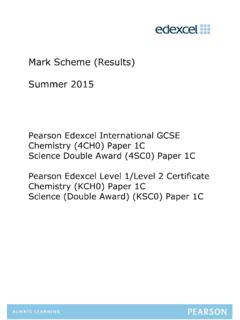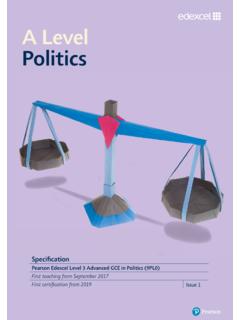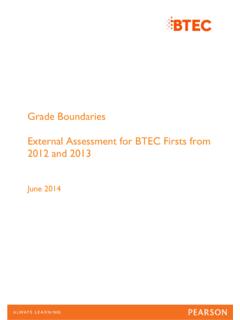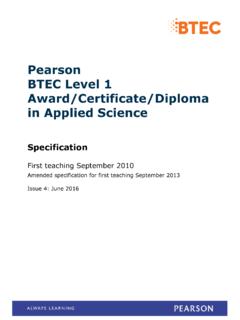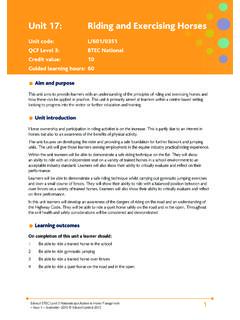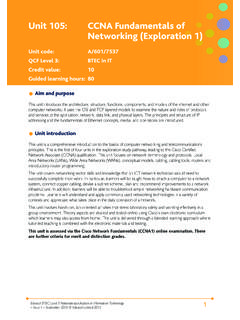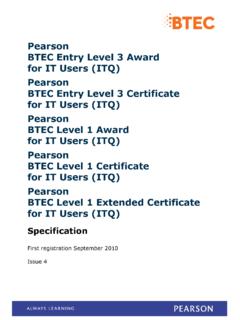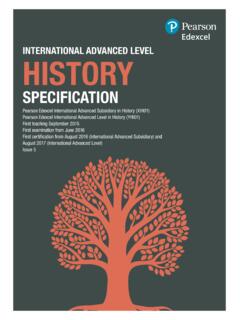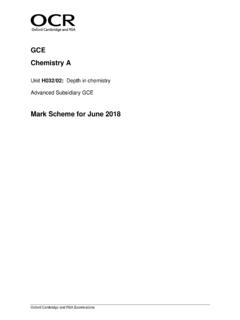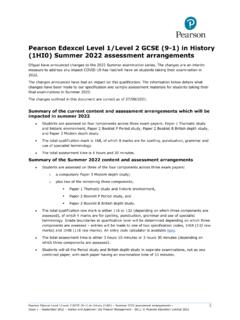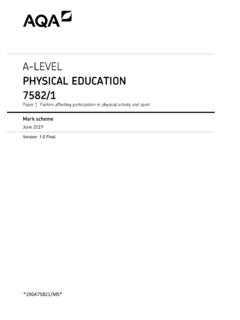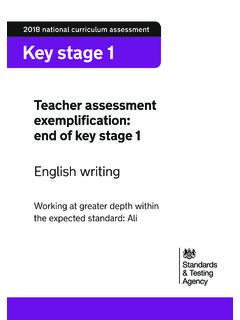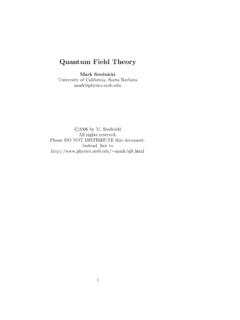Transcription of Mark Scheme (Results) - Edexcel
1 Mark Scheme (Results). January 2017. Pearson Edexcel International GCSE in Biology (4BI0) Paper 1B. Science Double Award (4SC0) Paper 1B. Pearson Edexcel Certificate in Biology (KBI0) Paper 1B. Science (Double Award) (KSC0) Paper 1B. Edexcel and BTEC Qualifications Edexcel and BTEC qualifications are awarded by Pearson, the UK's largest awarding body. We provide a wide range of qualifications including academic, vocational, occupational and specific programmes for employers. For further information visit our qualifications websites at or Alternatively, you can get in touch with us using the details on our contact us page at Pearson: helping people progress, everywhere Pearson aspires to be the world's leading learning company. Our aim is to help everyone progress in their lives through education. We believe in every kind of learning, for all kinds of people, wherever they are in the world. We've been involved in education for over 150 years, and by working across 70 countries, in 100 languages, we have built an international reputation for our commitment to high standards and raising achievement through innovation in education.
2 Find out more about how we can help you and your students at: January 2017. Publications Code 4BI0_1B_1701_MS. All the material in this publication is copyright Pearson Education Ltd 2017. General Marking Guidance All candidates must receive the same treatment. Examiners must mark the first candidate in exactly the same way as they mark the last. Mark schemes should be applied positively. Candidates must be rewarded for what they have shown they can do rather than penalised for omissions. Examiners should mark according to the mark Scheme not according to their perception of where the grade boundaries may lie. There is no ceiling on achievement. All marks on the mark Scheme should be used appropriately. All the marks on the mark Scheme are designed to be awarded. Examiners should always award full marks if deserved, if the answer matches the mark Scheme . Examiners should also be prepared to award zero marks if the candidate's response is not worthy of credit according to the mark Scheme .
3 Where some judgement is required, mark schemes will provide the principles by which marks will be awarded and exemplification may be limited. When examiners are in doubt regarding the application of the mark Scheme to a candidate's response, the team leader must be consulted. Crossed out work should be marked UNLESS the candidate has replaced it with an alternative response. Question Answer Notes marks number 1 (a) number of food chains = 8; 3. number of primary consumers = 4;. number of organisms that belong to more than one trophic level = 3;. (b) 1. glucose; 2. 2. respiration; 2. Ignore energy (c)(i) muscle(s) / leg muscle / named muscle; Ignore leg alone 1. (ii) 1. adrenaline; 3 max 2. increased heart rate / heart pumps more blood /. heart pumps faster / eq;. 3. increased breathing rate/depth / opens air passages / eq;. 4. increase blood flow to muscles / vasodilation in muscles /. vasoconstriction in gut / eq.
4 5. glycogen to glucose;. 6. respiration / energy / ATP;. (d)(i) A = retina; 2. B = optic nerve;. (ii) detect light / receive light / 1. contains light sensitive cells / converts light into impulses / eq;. (iii) impulses to brain; 1. Question Answer Notes marks number 2 (a) 1. obtain chickens with few/no feathers / eq; 3. 2. breed / reproduce / eq;. 3. continue process (for many generations);. (b) 1. egg production decreases as chickens get older; Allow converse for mps 2. 1 and 2. 2. decreases faster/more with chickens bred for egg production;. (c) 1. less movement; Ignore ref to lack of 3 max sunlight and vit D and 2. less respiration; calcium metabolism for egg shell 3. less heat loss / less energy used;. 4. energy for egg production;. Question Answer Notes marks number 3 (a) S scale linear and graph uses half the grid; 5. L lines straight and through points;. A1 axes correct way;. A2 axes labelled correctly: months and g per 100cm3 or g/100cm3.
5 P points plotted accurately;. (b)(i) (average) haemoglobin; 1. (ii) 1. used more than one person; 1. ignore repeat alone / 2 max reference to taking 2. calculated an average / eq; several months 3. ignored anomalous results / eq;. (iii) 1. age / eq; Ignore diet / exercise / 2 max oxygen level 2. gender / sex / eq;. 3. body mass / eq;. 4. health / stage of cancer / eq;. (c) 1. more haemoglobin; 4 max 2. red blood cells;. 3. oxygen;. 4. aerobic respiration;. 5. more energy / more ATP; 5. Ignore less tired 6. less lactic acid / less oxygen debt;. (d) 1. vein; use vein because 3 max arteries have a thick Two from: wall = 1 for mp5. 2. wide lumen / eq; capillaries = 0. 3. easy to see / near to surface (of skin);. 4. low blood pressure;. 5. thin wall / less muscular wall;. 5. Ignore less muscle Question Answer Notes marks number 4 (a) 50% are heterozygous = 3; 3. show a phenotype ratio of 1:1 = 1;. have a genotype ratio of 1:1 = 2.
6 (b)(i) 1. photosynthesis; 5 max 2. (growth of) algae / plants; (ONCE) 2. plant growth due to photosynthesis/minerals 3. food for fish; (ONCE). 3. Allow plants/manure 4. oxygen for respiration; as food for fish 5. bacteria / fungi / decomposers / decomposition;. 6. minerals / ions / named mineral; 6. Ignore nutrients 7. stated use of one named mineral;. (ii) 1. oxygen / prevent stagnation; 2. 2. remove waste / urine / faeces; 2. Ignore manure/. disease / pollution /. bacteria (c) 4,200 kg;; 2. allow one mark for 6000 x 700 / 6000 x / 4 200 000 in working Question Answer Notes marks number 5 (a) 1. osmosis; 3 max 2. water out;. 3. dilute to concentrated solution /. high conc. of water to low conc. of water /. high to low water potential;. 4. membrane leaves cell wall / plasmolysis / flaccid;. (b) C plus or minus salt / range of salt concentrations; 6 max O same species of plant / same size of plant / Allow named species same age of plant / same type of plant / eq.
7 R repeat / lots of plants / group / average / eq;. M1 measure mass / length / eq;. M2 reference to stated time;. S1 and S2 same light / same temperature /. same carbon dioxide / same soil / same water / eq;;. Question Answer Notes marks number 6 (a) CO2 + H2O C6H12O6 +. 1. correct chemical symbols used; O2 = 1 2. 2. correct balance;. (b) (i) 1. many chloroplasts; 1. Ignore chlorophyll 2 max 2. absorb/trap/capture light;. 3. (closely) packed / found near (upper) surface /. eq;. (ii) 1. air spaces / eq; 2. 2. diffusion of gas / CO2 / O2;. (iii) 1. open/close stomata/pores / 2. change size of stomata/pores;. 2. allow CO2 in / H2O out / O2 out; 2. all gas and direction must be correct for the mark (c) (i) 1. destarch / use up starch / eq; 2 max 2. respiration;. 3. prevent photosynthesis;. (ii) 1. water bath / eq; 2 max 2. extinguish flame / avoid naked flame /. turn Bunsen off / do not heat directly;. 3. ethanol is flammable / eq.
8 (iii) blue black / black / blue; 1. (iv) leaf in dark / leaf covered / omit step 2; 1. (d). 2. Mineral ion Biological molecule produced (magnesium) chlorophyll; Ignore chloroplasts nitrate / (protein). sulphate / Allow correct symbols ammonium /. eq;. Question Answer Notes marks number 7 (a) (i) A receptor; 4. B motor neurone;. C relay neurone / intermediate neurone / interneuron;. D sensory neurone;. (ii) 1. unconscious / involuntary / automatic / 2 max no brain involvement;. 2. fast (response) / eq;. 3. prevents damage / avoid harm / move finger off pin / eq;. (b) (i) 1. chemicals involved / eq; eg 1. accept 2 max neurotransmitters/adrenaline/. 2. receptors involved / eq; auxin 3. effectors involved / eq;. (ii) 1. (animal) electrical/impulses / (plant) chemical/hormone;. 2. (animal) fast / (plant) slow; 2. Ignore short and long term 2 max effect 3. (animal) stimulus and response distant /. (plant) stimulus and response close.
9 4. (animal) muscle contraction / (plant) growth response;. Question Answer Notes marks number 8 (a) (i) photosynthesis; 1. (ii) B and E; Must be both letters 1. only (b) (i) 1. reduce use of fossil fuel / coal / oil / eq; Ignore electricity / 2 max recycling / fewer 2. use nuclear / wind / sun / eq; factories 3. plant trees / reduce deforestation / grow more plants / eq;. 4. use public transport / cycle / trains / use fewer cars /. electric cars;. (ii) 1. greenhouse gas / greenhouse effect / trapping infrared /. trapping heat;. 2. global warming / increase in temperature / eq;. 3. melting ice caps / rising sea levels / flooding / eq;. 4. drought / climate change / extreme weather / storms / eq;. 5. loss of habitat / acidification / desertification;. 6. extinction / food chain disruption / less biodiversity / eq;. 6 max 7. migration / change in distribution / spread of disease /. spread of pests / eq;. Question Answer Notes marks number 9 (a) movement of particles/ions/molecules/gases/ from high Ignore substance 1.
10 Concentration to low concentration / eq;. (b) (i) / / recurring;; Allow one mark for 3 2. (ii) 1. as dye concentration increases diameter/ 2. diffusion increases;. 2. rate of increase reduces/levels at higher concentrations; eg. to increases by but to increases by only ;. (iii) 1. higher dye concentration means 2. more molecules/particles;. 2. higher concentration gradient / eq;. (c) 1. volume of dye / number of dye drops / mass of dye / Ignore time / pH / size of 2 max same dye; plate 2. depth of agar / size of wells / amount of jelly /. concentration of agar;. 3. temperature;. Question Answer Notes marks number 10 penis; 10. sperm / eq;. egg / ovum / ova;. fallopian (tube) / oviduct;. zygote;. mitosis;. embryo;. uterus / womb;. twice / double / two times;. diploid;. Question Answer Notes marks number 11 (a) (i) glycogen; 1. (ii) hyphae / hypha; 1. 2. (b) 1. (low fat) less risk of artery blockage / heart disease /.
